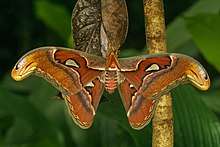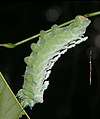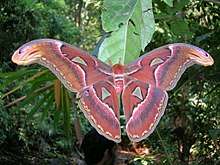Attacus taprobanis
Attacus taprobanis[2] is a moth of family Saturniidae. It is native to southern India and Sri Lanka.[3] This species is very similar in morphology to the much more widely distributed Attacus atlas. It was once considered a subspecies of A. atlas.[4]
| Attacus taprobanis | |
|---|---|
 | |
| Male | |
| Scientific classification | |
| Kingdom: | Animalia |
| Phylum: | Arthropoda |
| Class: | Insecta |
| Order: | Lepidoptera |
| Family: | Saturniidae |
| Genus: | Attacus |
| Species: | A. taprobanis |
| Binomial name | |
| Attacus taprobanis | |
Description
Attacus taprobanis is much darker than A. atlas. The hyaline spots are small and narrow. The hyaline streak on the forewing is absent. The wingspan about 170–220 mm, probably the second largest after A. atlas. In males, the forewings are maroon, sickle shaped, and smaller than the females'. The wings are fairly dark reddish brown. The lateral band is clearly pink but with little white vanes transparent stains are narrowly triangular in the male, large and teardrop shaped in females, the forewings, there is also a fairly narrow, tiny spot in front of the store.[5]
 Larva (early instar)
Larva (early instar).jpg) Larva (head)
Larva (head) Larva
Larva
 Imago (head)
Imago (head) Imago (male)
Imago (male) Imago (female)
Imago (female) Mating pair
Mating pair Attacus atlas, another similar species
Attacus atlas, another similar species
Ecology
The larvae feed on various bushes and trees including Aglaia roxburghiana, Berberis asiatica, Berberis thunbergii, Berberis vulgaris, Cinnamomum, Cinnamomum camphora, Cinnamomum zeylanicum and Ligustrum[6]. Adult moths do not take foods and survive on fat they have stored from their larval period. The females sitting most calm and emit pheromones, that the active males can notice from a distance.[7]
References
- "Attacus taprobanis, Moore, 1882–1883". gbif.org. Retrieved 4 July 2016.
- Moore, Frederic (1880). The Lepidoptera of Ceylon. Vol. II. London: L. Reeve & co. pp. 124–125.
- Peigler, Richard S. (1989). A revision of the Indo-Australian genus Attacus (Lepidoptera: Saturniidae). Lepidoptera Research Foundation. ISBN 0961146427. Retrieved 5 June 2018.
- Savela, Markku. "Attacus atlas (Linnaeus, 1758)". Lepidoptera and Some Other Life Forms. Retrieved 18 November 2018.
- Hampson, G. F. (1892). The Fauna of British India, Including Ceylon and Burma: Moths Volume I. Taylor and Francis. pp. 15–16 – via Biodiversity Heritage Library.
- Hosts database
- "Atlas Moth (Attacus taprobanis)". Biodiversity of Sri Lanka. 25 January 2016. Retrieved 4 July 2016.